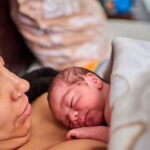Ask the experts: Protecting against Zika

A: Zika is a virus spread by the bite of […]
A: Zika is a virus spread by the bite of an Aedes species mosquito that has the virus. Pregnant women can also get Zika through any kind of sex with a person who has the virus. Expectant women with Zika virus during pregnancy might have babies with small heads (microcephaly) and other changes in the brain, which can cause lifelong problems.
To protect yourself, your baby and your family from mosquito bites:
- Do not travel to areas that have Zika virus.
If you live in or visit areas where there is Zika:
- Use EPA-registered insect repellents with one of the following active ingredients: DEET, picaridin, IR3535, oil of lemon eucalyptus, or para-menthane-diol. Follow the package directions on how often to apply.
- Wear long pants and long-sleeved shirts.
- Spray your clothes, as well as your exposed skin, with repellent. If using sunscreen, apply it before the repellent.
- Use a mosquito net while sleeping.
- Use condoms correctly and consistently during the pregnancy, or avoid having sex.
- Remove all standing water inside and outside your home. (These mosquitoes prefer to live indoors.)
- Clean or get rid of things where mosquitoes can breed, like buckets and old tires. (If you collect rainwater, make sure the container has a lid, and keep the lid tight. If the container does not have a lid, cover it with wire mesh that has holes small enough to keep mosquitoes out.)
If you are exposed to Zika, contact your health care provider for testing, diagnosis and follow-up.
—Tania J. Tetz, MPH, CHES, teratogen information specialist at MotherToBaby
The Centers for Disease Control and Prevention provides Zika resources on its website, including additional information about how MotherToBaby assists pregnant women who have questions. You can call MotherToBaby, a service of the nonprofit Organization of Teratology Information Specialists (OTIS), directly at 866/626-6847. Spanish-speaking specialists are available.







